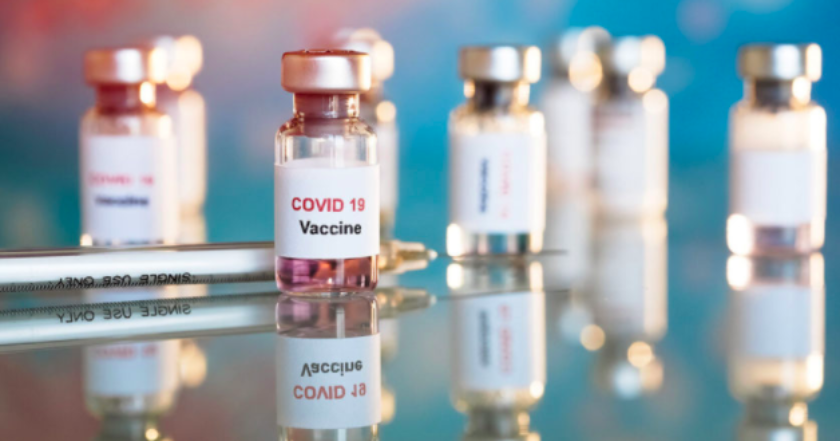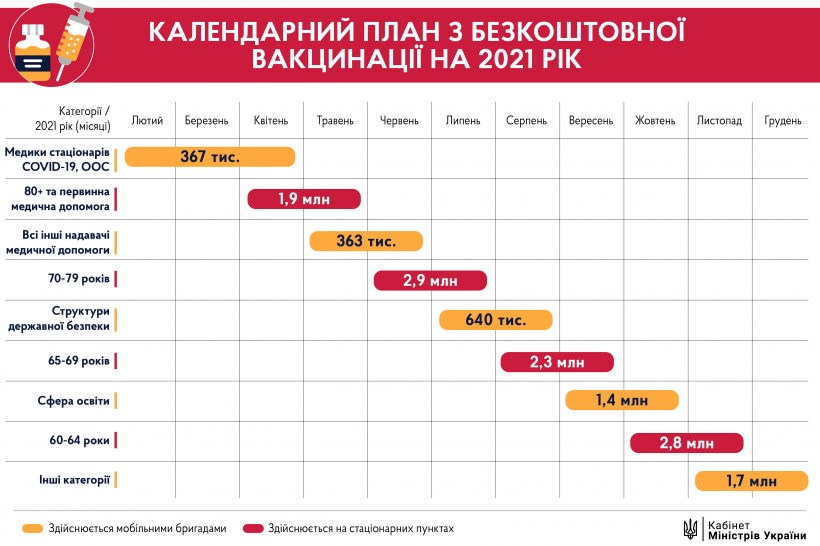Vaccination failure in Ukraine: who's responsible and when Ukrainians get access to vaccine
A campaign to immunize the population against coronavirus has started in all European countries, and only Ukraine trails far behind. The Ministry of Health promises to start vaccination in February, but the declared number of purchased drug doses will cover only 1% of the population. And it's unknown when we should wait for the next batch.
Why Ukraine turned out to be an outsider among European countries in the fight against coronavirus, and whether it's still possible to remedy the situation, read further on Rubryka.
Photo un.org
We'll have a vaccine but very little
Health Minister Maksym Stepanov cheerfully reported to Ukrainians that vaccination of the population wasn't far off, and would begin in late February this year. According to the minister, Ukraine expects to receive 700 thousand doses of Sinovac; another 117 thousand doses of Pfizer vaccines will officially be delivered to us, approximately on February 15, as part of the COVAX initiative.
There are certain doubts about the Chinese drug, though. When the Ministry, together with the Medical Procurement State Enterprise, reported on a contract being concluded for the supply of 1.9 million doses of Sinovac vaccine, the drug hadn't completed the third and final phase of research yet.
It caused an outpouring of criticism from Ukrainians, and Stepanov had to explain himself. The Head of the Ministry of Health assured that the vaccine would arrive in Ukraine a month after its registration in one of these countries: the USA, the UK, Switzerland, Japan, Australia, Canada, China, Israel, India, Mexico, Brazil, or the EU. The bet was placed precisely on Brazil, where Sinovac passed the third phase of testing.
Besides, under the agreement with Ukraine, the effectiveness of the Chinese vaccine must be at least 70%. If these conditions aren't met, the funds paid will be returned. And while the registration of the vaccine in Brazil is pending, the problem arose with the second point.
On January 12, world news outlets reported Sinovac had an "overall efficacy" of 50.38% in the last round of testing in Brazil. Thus, it turns out that it can't be used in Ukraine. And the day before, the Ukrainian pharmaceutical company Lekhim had signed a contract with the Chinese vaccine manufacturer Sinovac Biotech for the supply of another 5 million doses of coronavirus vaccine.
However, the Head of the National Technical Group of Experts on Immunization, infectious disease specialist Fedir Lapii, calls the data published in the media speculation.
"The Brazilian study also considered very mild forms of the disease that don't require medical attention. If we discard them and look at the effectiveness of the vaccine in mild cases needing medical attention, moderate and severe cases, then the effectiveness is 78%, and it's comparable to the effectiveness of the British AstraZeneca. And if we consider only moderate and severe cases, then there's an efficiency of 100%. But the statistically significant efficiency is exactly 78%," the infectious disease specialist explained.
Lapii notes that vaccine trials showed the production of antibodies and the body's immune response, and advises to wait until the third phase of clinical trials is completed, which will show whether this immune response protects against infection or severe disease. It's exactly what they call vaccine effectiveness.
In parallel, during the first half of the year, starting in February, Ukraine will be able to receive 2.2 to 3.7 million doses of AstraZeneca/Oxford vaccine for the next stages of the campaign. And it's only within the framework of the COVAX mechanism, as reported by the chief sanitary doctor of Ukraine Viktor Liashko.
So far, that's it that Ukrainians can count on. And the words of Ukrainian President Volodymyr Zelenskyi aren't very encouraging; in a recent interview with Axios on the American HBO channel, he admitted Ukraine wasn't on the priority list of countries for receiving the COVID-19 vaccine.
"It's very unpleasant to feel that you're standing with a begging bowl," Zelenskyi added.
Vaccination process isn't well-organized
Along with the lack of vaccines, we can trace another gap in the activities of the Ministry of Health in the fight against coronavirus—the lack of logistics for delivering, distributing, and designating vaccination points.
Olha Stefanishyna, People's Deputy from the Holos faction and a member of the Verkhovna Rada Committee on Public Health, Medical Assistance, and Medical Insurance, notes that there's no understanding in the regions of how they'll organize the campaign to immunize the population, where and who will vaccinate residents.
"In terms of the roadmap published by the Ministry of Health, there are only unspecific phrases. And I know that no one in the regions understands how it'll happen: where exactly the vaccination points will be, whether our capacities will withstand. Because the countries around the world are building additional vaccination points, erecting entire pavilions, or vaccinating in cathedrals, stadiums, parking lots. But it's clear as mud in our state. Plus, will we have enough doctors who, besides treating covid, should also vaccinate? Here you also need to attract additional opportunities and train personnel," People's Deputy explains.
Ministry of Health is responsible for vaccination failure but not only them
Naturally, the department that stands guard over protecting human health had to take care of the access of Ukrainians to the coronavirus vaccine. And at some points the Ministry has succeeded, says Fedir Lapii.
"Vaccination comprises two components: the first is preparation, the second is the vaccine availability. From the point of view of preparation, Ukraine is successfully passing this stage. We've identified priority vaccination groups, we've prepared the number of people to be vaccinated, a roadmap, a vaccination plan has been created," says the infectious disease specialist.
But the system won't work fully if there are no vaccines. And it was the Health Minister who took responsibility for the availability of the drug in Ukraine, so it's worth asking him, Lapii believes.
However, as you know, the Ministry of Health isn't directly involved in procuring vaccines; it's the concern of the Medical Procurement State Enterprise. But the recent scandal between Maksym Stepanov and the state enterprise director Arsen Zhumadilov showed the Ministry could still influence this procedure.
"If we talk about purchasing vaccines, then the situation is that all countries, vaccinating their populations today, were negotiating the purchase of vaccines in the summer, or even earlier. The Ministry of Health officially ordered negotiations on the purchase of vaccines on December 10. And now we're booking drugs last. It's, first," Olha Stefanishyna says. "Second, there was an incident with the Medical Procurement State Enterprise, when being instructed to conduct these negotiations on December 10, the head of this state enterprise announced pressure from the Ministry of Health on December 20, which involved them being manually recommended a specific company to buy from. In fact, the Ministry blocked other negotiations, and we were able to order only one vaccine through the Ukrainian company."
Purchasing vaccines was also slowed down by Ukrainian legislation, according to which Ukraine cannot allocate money for a drug that doesn't exist yet. Besides, in our country, they cannot register a medicine or vaccine that hasn't passed the third stage of clinical trials.
The situation is now being quickly changed by the Verkhovna Rada, which recently voted for Draft Law No. 4613 "On Amendments to the Law of Ukraine "On Medicines" Concerning State Registration of Medicines under Obligations." These changes will create mechanisms for the emergency registration of medications.
This mechanism operates in Europe and the United States, thanks to which the Pfizer and Moderna vaccines were registered. But why the Ukrainian authorities didn't make changes earlier, which could help Ukraine get the drug faster, isn't clear.
What can improve the situation
People's Deputy Olha Stefanishyna believes that, first, we should start with a coherent plan and schedule for the delivery of vaccines. Meanwhile, thinking over clear logistics from large cities of Ukraine to small villages, preparing a system, and attracting additional resources and funds.
"Second, the vaccine procurement process needs to be properly established. For example, through the COVAX initiative, you can not only receive humanitarian aid but also buy vaccines. Their portfolio has 8 vaccines from different manufacturers. Some of them are already registered and actively used, while others are in the last stages of clinical trials," the people's deputy says. "We need to stop playing corruption, put pressure on buyers, and buy vaccines."
But manufacturers have a problem with drug availability. According to Lapii, there's a shortage of vaccines. Even Pfizer warned its customers that it wouldn't be able to meet their needs under the contracts.
But Ukraine still has chances: "Pfizer is going to increase the capacity to 2 billion doses per year in 2021. In the meantime, more offers will appear during this year, and the price for them will decrease. Now we're just waiting for a miracle," Lapii says.
The problem with concluding contracts and supplying vaccines has led to the fact that while the leading world countries expect to fully vaccinate their populations by the end of this year, according to our vaccination roadmap, Ukraine plans to vaccinate only 50% of the population by the end of 2022. According to doctors, this number isn't enough to form herd immunity.
The Cabinet of Ministers even approved a 2021 calendar plan for COVID-19 vaccination of the population, on Friday, January 29. According to it, 367 thousand people will receive free vaccinations in February, March, and April: military and doctors working with the coronavirus-infected.
Although, on the same day, Stepanov admitted during an online discussion "Increasing EU assistance to the Eastern Partnership countries in the fight against COVID-19" that Ukraine might not receive the required number of vaccines on time.
"The demand for a vaccine in the global market is now huge, and the production capacity is extremely limited. The current situation in the vaccine market indicates that we might not be able to obtain the required amount of EU-certified drugs in the time frame that we need. Manufacturing companies aren't very willing to meet halfway, neither in price nor in proposals for the first half of 2021," the Minister of Health said.
It turns out that the approved plan can be postponed indefinitely. But whether mass immunization of the population starts in February, Ukrainians will find out very soon.
Author: Lana Ustymova
























































